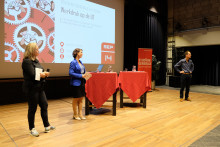In May last year, the Labour Inspectorate published an extensive report on psychosocial workload at Dutch universities. 691 academic staff members of the UT completed the accompanying survey. The main conclusion: the UT must tackle problems with work pressure and undesirable behaviour in the workplace at the source.
Commissioned by the UT, the UT's own occupational health and safety service – de Bedrijfspoli – set to work on a so-called risk inventory and evaluation of psychosocial workload. The main conclusion from this: the UT has more than enough initiatives and policy in the field of psychosocial workload, but lacks procedures, policy frameworks and control.
'Integrality in approach'
This recently resulted in a plan of action in this area. 'Both UT-wide and plans per faculty and service department,' explains HR director Hans Oeloff. According to him, this plan of action should mainly ensure an integrated approach to work pressure and undesirable behaviour. 'The Labour Inspectorate's opinion was mainly positive. The most important thing was the integration of parts and to have the subject structurally reflected in our PDCA cycle (a tool for quality management, ed.). That sums up exactly what this plan of action is for: a more integral approach to work pressure and undesirable behaviour.'
This is confirmed by UT vice-president Machteld Roos. 'These are topics that we have always paid attention to and that we have been prioritizing for some time. We also learn lessons from the reports of our own support structure every time. The labour inspection report is a similar step in the continuous process of providing a safe and pleasant working environment.'
So it's not that the UT is going to rigorously do everything differently and come up with new policies or initiatives. This UT-wide plan of action includes 71 interventions to improve the psychosocial workload. These range from creating more awareness about smoking policy and specific measures against aggression, to reducing the workload of specific 'risk groups' such as PhD students, assistant professors and managers.
Reporting point for undesirable behaviour
What will the UT community notice in the short term from the approach? Oeloff and Roos point out, among other things, an addition to the AFAS HR system to discuss workload and well-being during annual reviews. There are also already posters in buildings to make the offer in the field of social safety more visible.
In addition, extra attention is also paid to their own support structure, they explain. 'One of the recommendations was to make it more accessible and findable. That is why there will also be a central reporting point for undesirable behaviour. What that should look like exactly, is still being prepared together with the input of colleagues from the support structure and the unions,' says Oeloff. 'In any case, we don't see it as a kind of counter', Roos adds. 'Ultimately, it is important to facilitate a good conversation at all levels. And if it can't be solved properly, that there is an easy-to-find support structure that people can turn to.'
'Problems of all times'
Whether the UT will ultimately be able to tackle the problems with work pressure and undesirable behaviour at the source with this plan of action, as the Labour Inspectorate suggested? 'Work pressure and undesirable behaviour are problems of all times. They were there decades ago and will still be there in decades, that's how realistic we have to be,' says Oeloff. 'So this has and requires continued attention from all of us.'
'We stand for an inclusive and safe community with happy and healthy employees, that is paramount,' adds Roos. 'Every moment that we manage to reduce workload factors is a positive signal. But the world is changing, so the work in this is never finished. We hope that this plan of action can give us more direction for providing a safe, healthy and inclusive working environment.'






